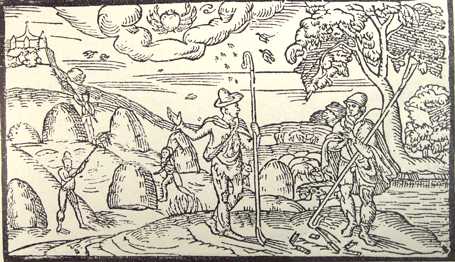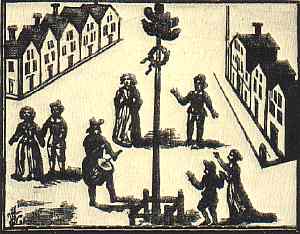Summer: mowing a meadow
Set mowers a-mowing, where meadow is grown,
The longer now standing, the worse to be mown.
Summer was a time for weeding, mowing grass for hay, and preparing the barns for the harvest to come. Like the other seasons, summer had its festivals, especially Midsummer's eve; Shakespeare's comedies especially celebrate the festivals of the year.
Festivals
The parish feast, also known as the wake, the revel, or the ale*, was an important social activity. Celebrations usually began on or near the feast day of the patron saint of the parish, and festivities continued for a week. Feasts were celebrated with various "rural merriments," including eating and drinking, dancing, sports, races, and bull-baiting.
In addition to the parish feast, there were other customs observed throughout the year:
- New Year's Night
- Plough Monday
- Shrove Tuesday
- May Day*
- Whitsun
- Midsummer's Eve*
- sheep-shearing festivities (late summer)
- harvest home festivals (autumn)
- Guy Fawkes Day in November (after 1605)
- pre-Christmas festivals in December*
- Christmas*
Footnotes
-
From Church to tavern
With growing Puritanism, the tavern became a centre for activities previously celebrated at church.
-
May Day
Celebrations on the first of May originated in ancient spring fertility festivals. Although the Christian Church co-oped the festial as Easter, it was still celebrated in Shakespeare's time with dances around the Maypole, Morris dances, and mumming.
Listen to the music of a Morris Dance: "The shepherds hey," arranged by Curtis Clark.
-
Midsummer's Eve
Midsummer's Eve was celebrated with a rather macabre custom; it was tradition that anyone who sat on the church porch on Midsummer's Night would see the apparitions of those parishioners who were to die in the coming year knocking on the church door.
-
Feast days
- Holidays in December
- For example, December 6 was a holiday for many schools in honour of St. Nicholas, patron saint of schoolboys.
-
Christmas
Christmas celebrations were especially elaborate in celebrations at Court, where many of Shakespeare's plays were performed.

